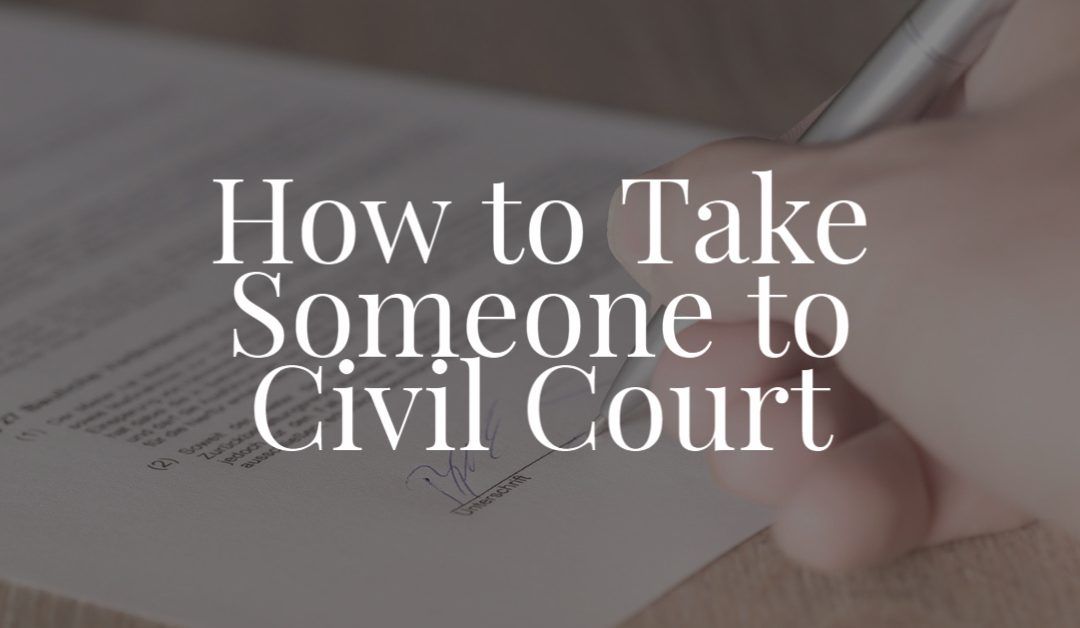No matter how charmed the life you lead, disagreements are bound to happen occasionally. When things heat up and you need someone to help you settle a problem, the legal civil litigation system is sometimes the answer. When you can’t find a way to right the wrong, you need to know how to take someone to civil court.
Small Claims Court
Depending on the type of case and the amount of money you are seeking in damages, you may file your lawsuit in small claims court. Small claims court helps people seek damages of not more than $5,000 to $10,000. Each county determines the limit on what kinds of cases they will see. Each county also determines its monetary damages limit. You can contact the clerk of court in your county to find out your local small claims court limit.
If you are filing the case, you are called the “plaintiff.” The person you are suing is the “defendant.” A magistrate oversees the process and makes the ruling. The court filing fee is only $95, and if you win as the plaintiff, the defendant pays this fee.
There is no jury in small claims court, and you are not required to have an attorney represent you. However, you must still use specific civil procedural standards. An attorney can help if you struggle to navigate the system.
Types of Plaintiff Cases
You can bring several different types of cases in small claim courts as the plaintiff, including:
- Eviction Cases: As a landlord, you may need to start or handle an eviction process already underway. An eviction case is called a “Summary ejectment.” You can find out more about this kind of case at NC Courts Landlord & Tenant Issues
- Suing Your Landlord: If your landlord is more of a slumlord and refuses to repair your home to livable standards, you can sue for damages (money for your pain and troubles) and repairs.
- Personal Property: These are cases where you seek the return of specific personal property, such as a vehicle, where the property’s fair market value does not exceed $10,000.
- Enforcement of Liens: This is for cases involving mechanic and storage liens
Types of Defendant Cases
You can also face a case in court where a plaintiff files against you as the defendant. Some cases you might find yourself a defendant in include:
- Property Cases: Your sister sues you for a record collection that you took from the estate of your mother without permission from the estate administrator
- Lien Cases: You took out a car loan and did not continue to pay your monthly statement. The company wants to repossess the car, but you’ve not made it accessible to them.
- Landlord/Tenant: Your landlord sues you for back rent and damage to your leased home.
You can file your case in Small Claims Court by using the NC Courts Guide and File process. If you need additional help with the filing process, contact a local civil attorney. An experienced attorney can do the filing and answer any questions you may have.
District Court
If you are requesting more damages than your county’s small claims court’s limit, you must file your case in district court. District court will hear cases of up to $25,000. If you are requesting more than $25,000, you must file your claim in superior court. (1)
Filing a case in the district or superior courts is more complicated, and you may need an attorney unless you are familiar with the law and civil procedure. Sometimes the courts will require you to go through a process called “arbitration.” Arbitration is a binding legal process to reach an agreement with a defendant about monetary issues outside of a judge’s ruling.
Some cases that you may desire to take to the civil district or superior court with an experienced attorney include:
- Claims for money owed above $10,000
- Civil Rights Violations
- Real Estate and Estate Planning Issues
- Supplemental proceedings to recover judgments
- Appeals of civil matters to the NC Court of Appeals and NC Supreme Court
- Wage and Hour Cases
- Domestic violence protective order and civil restraining orders
In these types of complicated cases, several applicable laws determine the outcome of your case. It is harder to represent yourself because of the sheer volume of statutes that may apply to your issues. The district and superior courts also hold to a higher standard of civil procedure, and you may need an attorney to navigate this complex landscape.
Find the Help You Need
Our experienced civil litigation attorneys at Hopler, Wilms, and Hanna want to represent your best interests in our complicated court system. Litigation is a long process that can sometimes drag on for years. You need a team to come alongside and walk you through the process to justice for your struggles. No matter the case you are facing, you deserve a caring representation who can speak for your pain and suffering. Get the award you deserve for your pain and suffering.

